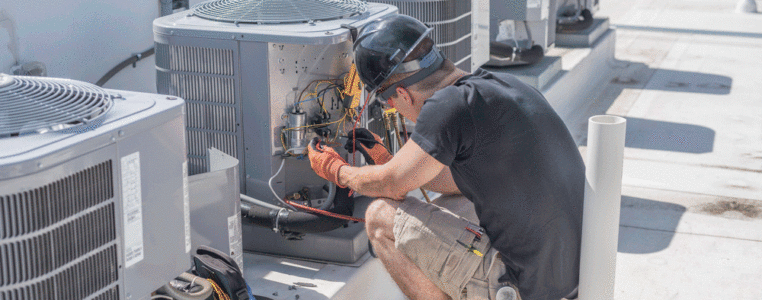HVAC Business Loans: What Every Contractor Should Know

Running an HVAC business comes with financial challenges. This is especially correct when managing payroll and handling seasonal revenue fluctuations.
Many contractors turn to HVAC business loans to maintain financial stability and make sure their employees are paid on time. Knowing available financing options helps business owners avoid cash flow disruptions and keep their teams running efficiently.
HVAC Business Loans: Six Options
Traditional Bank Loans for HVAC Businesses
Bank loans give HVAC contractors long-term financing solutions for general business expenses. These loans typically offer lower interest rates and structured repayment terms. They are a practical choice for businesses with strong financial histories. However, strict approval requirements make it difficult for many small contractors to qualify.
Lenders assess financial stability and credit history before approving a loan. While these loans can support businesses with consistent revenue, they may not be ideal for those facing cash flow gaps. HVAC companies needing fast financial relief for payroll may find bank loans too slow or restrictive.
Seasonal demand shifts can make it challenging for HVAC contractors to maintain a steady cash flow. Bank loans are often structured for long-term financing rather than immediate payroll needs. Businesses requiring faster access to funds may need a more flexible financing option.
SBA Loans for HVAC Companies
Small Business Administration (SBA) loans offer government-backed financing to HVAC businesses needing financial support. These loans bring funding for general business expenses, including short-term cash flow management. With lower interest rates and extended repayment periods, SBA loans can be an attractive option for established contractors.
The approval process for SBA loans requires extensive documentation. This can cover financial statements and revenue projections. Contractors with strong credit histories are more likely to qualify. Meanwhile, newer businesses may face difficulties securing funding. Due to the lengthy application process, SBA loans may not be the best choice for businesses in need of immediate payroll funding.
While SBA loans can help HVAC companies stabilize finances, they are not always a quick solution. Many businesses experiencing revenue delays or seasonal slowdowns require faster access to capital. Alternative financing options may be a better fit for contractors needing to cover payroll without delays.
Alternative Loans for HVAC Businesses
Alternative loans give HVAC businesses quick access to capital when traditional financing is unavailable. These loans often have flexible requirements. This makes them accessible to contractors with lower credit scores or irregular revenue patterns. Though interest rates are typically higher, approval processes are faster. For this reason, they are a good option for short-term funding.
Alternative financing focuses more on revenue potential than credit history. Therefore, it’s a useful tool for covering payroll when income is delayed or during seasonal downturns. Many HVAC contractors use alternative loans to prevent payment disruptions and keep their teams working.
Repayment terms vary depending on the lender. That’s why it is important for business owners to carefully assess loan conditions. Choosing a provider that offers flexible repayment options can help avoid unnecessary financial strain. Alternative loans are most effective when used strategically to address short-term cash flow shortages.
Business Lines of Credit for HVAC Contractors
A business line of credit comes with ongoing access to funds. It helps HVAC companies manage fluctuating payroll needs. Different from traditional loans, this financing option allows businesses to withdraw funds as needed and only pay interest on the amount used. The flexibility is beneficial for covering payroll gaps and addressing temporary cash flow shortages.
Lines of credit function as revolving accounts. This means funds become available again once repaid. As a result, they are a practical resource for HVAC contractors dealing with seasonal demand shifts or unexpected payroll expenses. Both secured and unsecured options are available, with interest rates depending on creditworthiness.
For HVAC businesses that need consistent access to capital, a line of credit delivers financial stability. It allows contractors to pay employees on time without committing to lump-sum loans. Maintaining access to this type of funding can prevent financial stress and payroll disruptions.
Working Capital Loans for HVAC Companies
Working capital loans help HVAC businesses manage short-term payroll expenses when revenue is delayed. These loans give quick access to cash. This makes them a reliable solution for contractors facing temporary cash flow shortages. Since they do not require long-term commitments, they are often used during slow seasons to keep payroll uninterrupted.
Unlike traditional bank loans, working capital loans are based on revenue performance rather than strict credit requirements. For this reason, they are more accessible to small businesses that may struggle with fluctuating income. Many HVAC contractors use these loans to avoid payroll disruptions and maintain employee trust.
Since interest rates can vary, business owners should carefully review repayment terms before committing. Selecting a loan with favorable conditions can help manage short-term financial needs without long-term burdens. When used wisely, working capital loans can keep payroll on track without adding unnecessary debt.
Payroll Funding for HVAC Contractors
Payroll is one of the most important financial responsibilities for HVAC business owners. Unexpected cash flow disruptions can make it difficult to pay employees on time. This can lead to financial stress and workforce instability. Payroll funding presents a short-term financing solution. It makes sure that employees are paid even when revenue is delayed.
Payroll funding is specifically designed to cover payroll expenses. This funding option allows HVAC businesses to meet payroll deadlines without using operational funds or waiting for customer payments. Many contractors rely on payroll funding to manage seasonal slowdowns and unexpected cash flow gaps.
Payroll funding offers a fast and efficient way to meet employee payment obligations. Instead of worrying about revenue fluctuations, HVAC business owners can focus on delivering services and maintaining a stable workforce. This financing option guarantees that payroll remains a priority, even during uncertain financial periods.
A Reliable Payroll Solution for HVAC Contractors
Managing payroll can be challenging, especially when revenue delays create financial uncertainty.
If your business needs fast, reliable payroll funding solutions, Payro Finance can help. Our service gives immediate access to capital so that you can meet payroll obligations without taking on long-term debt. Contact us today to learn how our payroll funding solutions can support your HVAC business.
Morris Reichman
hello@payrofinance.comMorris Reichman is the founder and CEO of Payro Finance. Former Vice President at Infinity Capital Funding an alternative finance company, Morris possesses a versatile background in the finance industry. Having spent 7+ years working across global macro operations and start up corporate finance Morris's expertise is in business accounting, risk management and investment analysis. Morris founded Payro Finance to support business owners and ensure their business continuity.
Need a short-term loan to cover payroll?
Apply in under two minutes, and get approved within 2 days. Once approved, funds are in your account the same day.
- Always 1.5% weekly
- Up to $500,000
- Same-day funding


